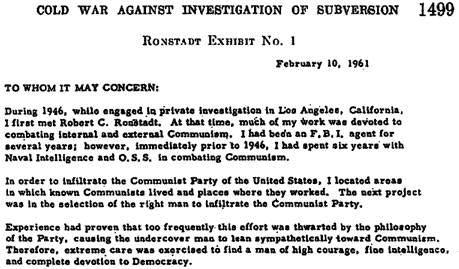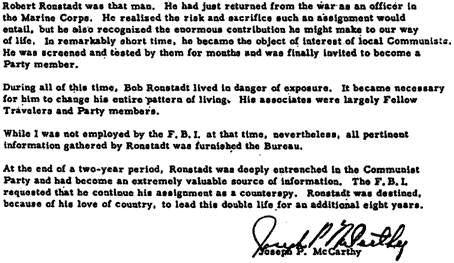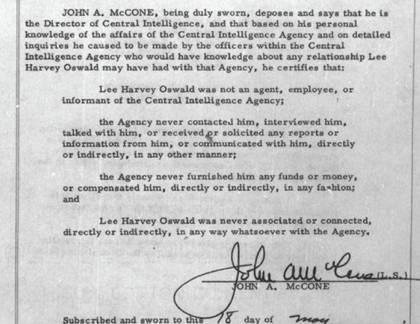Impossible: The Case Against Lee Harvey Oswald (27 page)
Read Impossible: The Case Against Lee Harvey Oswald Online
Authors: Barry Krusch
Tags: #Non-Fiction, #History
But let’s take this further: if there
was
a conspiracy, there are at least two possibilities that would lead to a “not guilty” verdict for Oswald:
- There was a conspiracy, but Oswald was completely unaware of, did not participate in, and had no foreknowledge of it.
- There was a conspiracy, and Oswald had some awareness and foreknowledge of the events that were the subject of the conspiracy, but Oswald was not made aware of the true nature of the conspiracy, nor of his role in it, and did not participate in any way that could be construed as “participation in a conspiracy.”
If the possibility is the first one, then obviously Oswald has no guilt whatsoever. He is
completely
cleared. Not guilty.
What is more likely based on the evidence that has been developed in dozens of books and articles is Possibility Two, that Oswald had some awareness of what was going on, but was given a “cover” story leading to actions used to implicate him later on, and if there was such a “cover” story, this could likewise lead to a “not guilty” verdict. The plausibility of this hypothesis would be a function of any evidence introduced to show that Oswald was acting as an undercover agent for the United States government in the five years previous.
From the standpoint of probability alone, there was an excellent chance of this, as Mark North related in his book, quoting a press report of 1962 (
Act Of Treason
, p 213):
“The Federal Bureau of Investigation has nearly 1500 informants in the 8500-member Communist party, according to a former agent who also made public a report criticizing the ‘autocratic’ way the bureau is run. The former agent is Jack Levine. . . . The bureau, Mr.Levine said, had found that the informants payroll had become a ‘severe drain,’ and that ‘through its dues-paying FBI contingent it had become the largest single financial contributor to the coffers of the Communist party.’”
In other words, with 1500 informants out of 8500 Communists, there was a 17% chance in 1962 that Oswald worked for the government, with no more evidence than that!!
This excerpt from North’s book provides another interesting historical takeaway: that the biggest single
supporter
of the Communist Party in 1962, considered at the time one of the greatest
threats
to the United States government was (drum roll) . . .
the United States government
!
And, there is a 17% chance that at least one of the “subversive” actions conducted at the time by some of those “communists” was in fact the actions of . . .
the United States government
!
File that one away for the time being
Returning to the main point at hand, this program had a long history, certainly pre-dating the “red scare” of the 50s. The agents sent to infiltrate the Communist party in these earlier days exposed themselves to at least two kinds of risk; the risk of being found out by the Communists, and the risk of falsely being accused as a Communist by those out of the loop.
One such individual was Robert Ronstadt, who, like Oswald, was an ex-marine, recruited by the government to go undercover and become a “communist.” An affidavit was prepared in his behalf by Joseph McCarthy:
6
The man selected for the mission was Ronstadt, who went on to live his double identity for a total of ten years, from 1946 to 1956:
Ex-marine Ronstadt himself indicated that when he was accepted into the Communist Party he reported directly to the FBI, and the FBI was keenly interested in that information not getting out (Ronstadt testimony, p. 1497):
Undercover work can be extremely dangerous when people think that you are a Communist, and you actually are not! In Ronstadt's case, it got out that he was both a Communist and an FBI informer, except the media got the order reversed, and accused him of being a communist-turned-FBI-informer, instead of what he was, an ex-Marine FBI informer who had infiltrated the Communist Party and who never was truly a Communist to begin with. Ronstadt explained what happened when his cover was blown (Ronstadt testimony, p. 1510):
Could what we learned about Ronstadt have applied equally well to Oswald? If so, Oswald’s actions as a “Communist” pre-dating the assassination would have been
under the orders of the U.S. government
, and we know that the
Northwoods
memo anticipated using similar false communists in one of their phony “terror” campaigns.
In addition, some have argued that Oswald could have been not only an agent of the FBI, but also the CIA, even though the CIA disavowed any knowledge of his actions (CE 870: 17 H 866):
7
The CIA says, “he’s not our man.” But then again, if the man accused of killing the President of the United States
was
, would they have admitted to it?
Of course not, not only in that circumstance, but even in less controversial circumstances, especially if Oswald was what was referred to as a “long-range-asset,” an individual either given a new identity or one who had an old identity extensively redefined. Allen Dulles, the ex-CIA director fired by Kennedy (who served on the Warren Commission), explained how the CIA went about creating these “long-range-assets” (
The Craft of Intelligence
, pp. 54-5):
If you are really born in Finland but are supposed to have been born in Munich, Germany, then you must have documents showing your connection to that city. You have to be able to act like someone who was born and lived there. Arrangements have to be made in Munich to confirm your origin in case an investigation is ever undertaken. . . . Obviously, an intelligence service will go to all this trouble only when it is intent upon creating deep-set and long-range assets.
Having created a cover for agents of this nature, the government would then, if questioned, write a letter similar to the affidavit above signed by McCone and deny any connection, even to the extent of not paying individuals for the covert operations in those cases when the lawsuit would reveal the identity of the covert operative, preserving the intelligence community Holy Grail of “plausible deniability.”
We think of this spycraft as a modern phenomenon, but it’s as least as old as the 19th century. We know this because a case on just this point went to the Supreme Court in . . . 1875!
In that case,
Totten v. United States
(92 U.S. 105), Enoch Totten claimed to have been hired by President Lincoln for a “secret service” (the word “covert” not in vogue at the time) at the then-whopping salary of $200 per month for a military intelligence mission.
This case established the precedent that an intelligence agent could not compel the government by court action to pay for covert actions rendered. For our purposes, what we learn from the case is that government will always deny the existence of covert operations. As the Court stated,
8
The service stipulated by the contract was a secret service; the information sought was to be obtained clandestinely, and was to be communicated privately; the employment and the service were to be equally concealed.
Both employer and agent must have understood that the lips of the other were to be forever sealed respecting the relation of either to the matter.
This condition of the engagement was implied from the nature of the employment, and is implied in all secret employments of the government in time of war or upon matters affecting our foreign relations where
a disclosure of the service might compromise or embarrass our government
in its public duties . . .
So, if anyone expects the CIA to reveal that Oswald was an agent of the CIA (if he was), don’t hold your breath.
But if Dulles wouldn’t talk, others would. A former finance officer for the CIA, Jim Woolcott, claimed that Oswald was a CIA double agent to the Soviet Union. Woolcott had issued the paychecks for a counterespionage project in which Oswald was involved (
JFK And The Unspeakable
, p. 366).
Other books
Promise me tomorrow by Unknown
The Edge of Justice by Clinton McKinzie
Tears by Francine Pascal
The Rush by Ben Hopkin, Carolyn McCray
The Rift by Bob Mayer
Area 51: The Reply-2 by Robert Doherty
Worth It All (The McKinney Brothers #3) by Claudia Connor
Unexpected Romance by Asrai Devin
14 Stories by Stephen Dixon
Two in the Afternoon by Cora Cade




